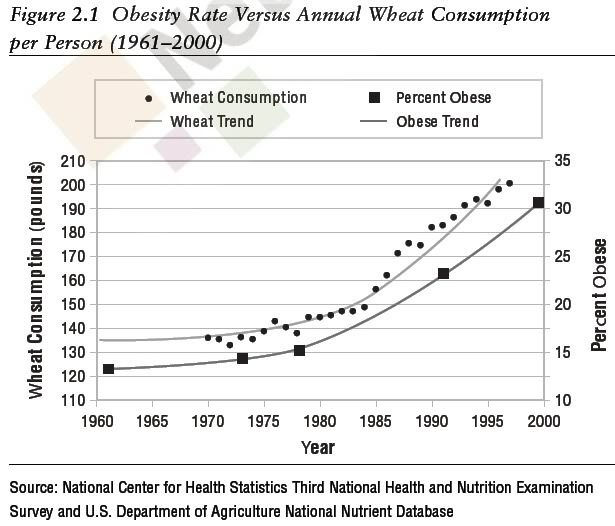TromboneAl
Give me a museum and I'll fill it. (Picasso) Give me a forum ...
- Joined
- Jun 30, 2006
- Messages
- 12,880
In this thread, and Rustic23 mentioned the book:
Amazon.com: The Glycemic-Load Diet: A powerful new program for losing weight and reversing insulin resistance (9780071462693): Rob Thompson: Books
I read it not to find out how to lose weight, but to find out more about this low-carb business, and understand the country's obesity problem.
I just finished it (you can probably read it online via your library and NetLibrary.com), and it's worth summarizing here. Here are the main points:
Prehistoric man had very little starchy carbohydrates in his diet, and most of it was "entangled in fiber or locked in impervious husks." It's only in the last 10,000 years that changes in agriculture and food processing has made this starch more prevalent and more accessible to rapid digestion. The human digestive system has not had a chance to adapt to this change.
In the 1970s, the government and medical organizations recommended that people cut down on fat and cholesterol, and as a result, consumption of carbohydrates increased significantly.
The idea that ingesting less cholesterol will significantly influence your cholesterol levels is not a good assumption.
When you eat something like a potato or piece of bread, the carbohydrates are broken down very quickly. "Within minutes, your blood glucose shoots up to levels never experienced by your prehistoric ancestors. These 'glucose shocks' are foreign to the way human digestive systems worked for millions of years..."
This results in excessive insulin production, which in turn encourages your body to store calories as fat.
Also, "...starch short-circuits into your bloodstream in the first foot or two of your intestine and never reaches the last part of your digestive tract, where important appetitesuppressing hormones come from."
The author recommends that you avoid this by cutting down on potatoes, bread, rice, and sugar-flavored drinks. He says that if you want to keep it simple, just do this: "Don’t eat more than a quarter serving of flour products, potatoes, or rice at a time, and
abstain from sugar-containing soft drinks and fruit juices."
Brown rice and whole wheat bread are just about as bad as refined white rice and white bread.
Moderate exercise, such as walking, increases insulin sensitivity in slow-twitch muscles as long as it's done regularly (for example, not just on weekends).
Atkins had the right idea, but his diet was too restrictive, eliminating some foods, like fruit and milk, that need not have been restricted. The result was that people were unable to stick to the diet.
The current obesity epidemic is a direct result of the prevalence of starchy carbohydrates in our diet, and an indirect result of advice to reduce fat and cholesterol intake.

--------------------------
The book is an easy read, and he presents good evidence for all of the above points. There's a lot more information in the book, of course, than I discussed here.
Amazon.com: The Glycemic-Load Diet: A powerful new program for losing weight and reversing insulin resistance (9780071462693): Rob Thompson: Books
I read it not to find out how to lose weight, but to find out more about this low-carb business, and understand the country's obesity problem.
I just finished it (you can probably read it online via your library and NetLibrary.com), and it's worth summarizing here. Here are the main points:
Prehistoric man had very little starchy carbohydrates in his diet, and most of it was "entangled in fiber or locked in impervious husks." It's only in the last 10,000 years that changes in agriculture and food processing has made this starch more prevalent and more accessible to rapid digestion. The human digestive system has not had a chance to adapt to this change.
In the 1970s, the government and medical organizations recommended that people cut down on fat and cholesterol, and as a result, consumption of carbohydrates increased significantly.
The idea that ingesting less cholesterol will significantly influence your cholesterol levels is not a good assumption.
When you eat something like a potato or piece of bread, the carbohydrates are broken down very quickly. "Within minutes, your blood glucose shoots up to levels never experienced by your prehistoric ancestors. These 'glucose shocks' are foreign to the way human digestive systems worked for millions of years..."
This results in excessive insulin production, which in turn encourages your body to store calories as fat.
Also, "...starch short-circuits into your bloodstream in the first foot or two of your intestine and never reaches the last part of your digestive tract, where important appetitesuppressing hormones come from."
The author recommends that you avoid this by cutting down on potatoes, bread, rice, and sugar-flavored drinks. He says that if you want to keep it simple, just do this: "Don’t eat more than a quarter serving of flour products, potatoes, or rice at a time, and
abstain from sugar-containing soft drinks and fruit juices."
Brown rice and whole wheat bread are just about as bad as refined white rice and white bread.
Moderate exercise, such as walking, increases insulin sensitivity in slow-twitch muscles as long as it's done regularly (for example, not just on weekends).
Atkins had the right idea, but his diet was too restrictive, eliminating some foods, like fruit and milk, that need not have been restricted. The result was that people were unable to stick to the diet.
The current obesity epidemic is a direct result of the prevalence of starchy carbohydrates in our diet, and an indirect result of advice to reduce fat and cholesterol intake.

The book is an easy read, and he presents good evidence for all of the above points. There's a lot more information in the book, of course, than I discussed here.
